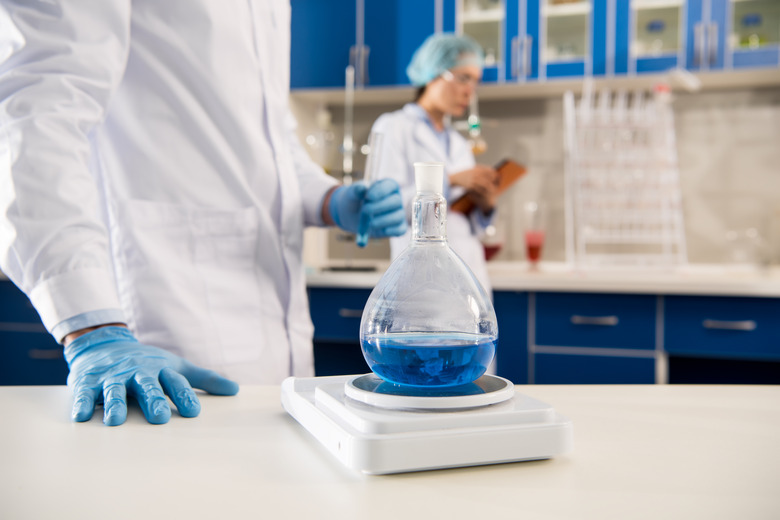How To Calculate Percent Change In Mass
Chemistry classes often include experiments and problem sets that involve calculating percent change in mass of a substance. The percent change in mass shows what proportion of a substance's mass has changed over time. For instance, if one-fourth of a rock's mass is worn away over a year, that rock's mass has a change of 25 percent. To calculate percent change in mass for an object, you need to know only its initial and final masses and simple multiplication and division.
Measure Initial and Final Mass
Measure Initial and Final Mass
To determine the percent change in an object's mass, you first need to know how much mass you had to begin with. Say you're conducting an experiment where you place water in a beaker and see how much evaporates over 24 hours. You would begin by measuring the mass of the water, using a scale. First, you weigh the beaker without the water, and then weigh the beaker with the water in it. Subtracting the mass of the beaker from the mass of the water gets you the initial mass of the water. If your beaker has a mass of 0.5 kilograms, and the beaker with water has a mass of 1.75 kilograms, the initial mass of the water is 1.25 kilograms.
After the 24 hours passes, you weigh the beaker with water in it again to see how the mass has changed. Subtract the mass of the beaker you calculated at the beginning to determine the final mass of the water. If the beaker with water in it were to have a mass of 1.60 kilograms at the end of your experiment, the final mass of your water would be 1.10 kilograms.
Calculate the Change in Mass
Calculate the Change in Mass
Once you have the initial and final masses of your substance, subtract to determine the difference. This simple calculation shows the amount the mass has changed. The smaller of the two masses is always subtracted from the larger, regardless of which is initial or final. For the water experiment, you'd subtract the smaller final mass from the larger initial mass:
\(1.25\text{ kg} – 1.10\text{ kg} = 0.15\text{ kg}\)
You can see from this calculation that the mass of the water changed by 0.15 kilograms over the course of your experiment.
Divide Change in Mass by Initial Mass
Divide Change in Mass by Initial Mass
Finally, you divide the change in mass by the initial mass of your substance. This calculation shows what proportion of the initial mass changed.
\(\frac{0.15\text{ kg}}{1.25\text{ kg}} = 0.12\)
To find the percent change, simply multiply this number by 100.
\(0.12\times 100 = 12\%\)
So 12 percent of the water in the beaker has evaporated over the course of your experiment. Note in your final answer whether the percent change is an increase or a decrease. If the initial mass is higher than the final mass, it is a decrease; if final is higher than initial, it's an increase.
Mind Your Units
Mind Your Units
Whenever you're doing calculations involving mass, be sure that the units of mass in your initial and final measurements are the same before you calculate percent change. If not, convert one of the measurements so both use the same units. For instance, if you were asked to calculate a percent change of lead with an initial mass of 2 kilograms and a final mass of 0.5 pounds, you might convert the mass of kilograms to pounds (4.40lbs) before you did your percent change calculation. Note that it does not matter which specific unit you used in your percent change calculation; you could also convert the final mass into kilograms.
Cite This Article
MLA
Zamboni, Jon. "How To Calculate Percent Change In Mass" sciencing.com, https://www.sciencing.com/calculate-percent-change-mass-5133030/. 5 December 2020.
APA
Zamboni, Jon. (2020, December 5). How To Calculate Percent Change In Mass. sciencing.com. Retrieved from https://www.sciencing.com/calculate-percent-change-mass-5133030/
Chicago
Zamboni, Jon. How To Calculate Percent Change In Mass last modified August 30, 2022. https://www.sciencing.com/calculate-percent-change-mass-5133030/
